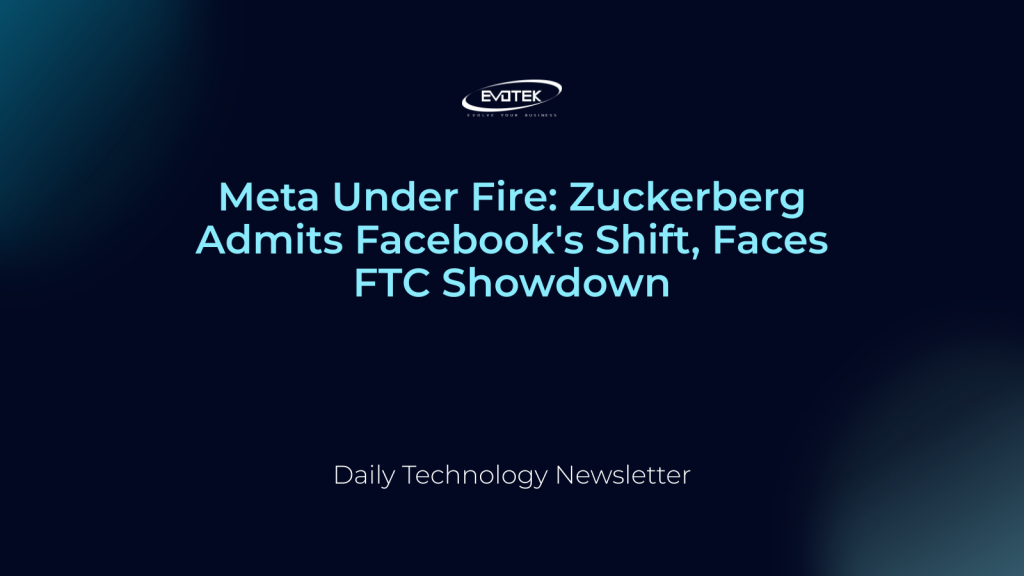Mark Zuckerberg is once again making headlines, but this time it’s not for acquiring a new company. Instead, he’s facing a legal battle that could redefine the digital landscape. The U.S. Federal Trade Commission (FTC) has brought a lawsuit against Meta, accusing the tech giant of stifling competition through strategic acquisitions. The core question: Did Meta illegally buy out competitors like WhatsApp and Instagram to maintain its dominance?
The trial, underway since April 14th, has already unearthed some startling revelations. Zuckerberg himself admitted that Facebook, the platform that launched his career, no longer prioritizes connecting friends and family. Let’s delve into the details of this unfolding saga.
Zuckerberg’s Testimony: Facebook’s Evolving Purpose
During his testimony, Zuckerberg acknowledged that Facebook has shifted away from its original mission. He stated that Meta’s focus is now on content discovery, identifying trending topics, and facilitating global conversations. In essence, the platform has transformed from a space for sharing personal updates to an algorithm-driven showcase.
Defending the Acquisitions: Instagram and WhatsApp Under Scrutiny
The trial has heavily scrutinized Meta’s acquisitions of Instagram (in 2012) and WhatsApp (in 2014). Zuckerberg defended these decisions, arguing that these platforms would not have thrived without Meta’s investment and are now indispensable tools for billions of users. His argument boils down to: “We didn’t destroy them; we amplified their impact.”
The FTC’s Allegations: A Monopoly in the Making?
The FTC paints a different picture. They presented internal emails during the trial in which Zuckerberg allegedly described Instagram as a “terrifying threat” that needed to be “neutralized at all costs.” The revelation of a rejected $6 billion offer for Snap in 2013 further fueled the FTC’s argument that Meta has a systematic policy of eliminating rivals. The FTC suggests a deliberate strategy to eliminate competition, raising concerns about a potential monopoly, considering that WhatsApp and Instagram collectively boast 2 billion direct users and generate over half of Meta’s advertising revenue.
Meta’s Defense: “We Are Not a Monopoly”
Meta vehemently denies these accusations, asserting that it faces competition from platforms like TikTok, Reddit, YouTube, and X (formerly Twitter). The company also emphasizes that its acquisitions were legally approved at the time. Furthermore, Meta argues that undoing these acquisitions now would unfairly change the rules of the game.
The Road Ahead: A High-Stakes Legal Battle
The trial is expected to continue until July 2025. Should the FTC prevail in this initial phase, a subsequent, more challenging stage would commence, aiming to demonstrate that forcing Meta to divest Instagram and WhatsApp would directly benefit competition and consumers.
What’s at Stake: The Future of Big Tech
This trial has profound implications for the future of large digital platforms. If Meta loses, other tech giants like Google and Amazon could face similar legal challenges. While pressure on big tech is not new, this time, Zuckerberg finds himself in the hot seat, with potentially far-reaching consequences for the industry.
Key Takeaways:
- FTC lawsuit accuses Meta of anti-competitive practices.
- Zuckerberg admits Facebook’s shift away from connecting friends and family.
- Acquisitions of Instagram and WhatsApp under intense scrutiny.
- The trial could reshape the future of big tech regulation.
Stay tuned for further updates on this landmark case.

 日本語
日本語 한국어
한국어 Tiếng Việt
Tiếng Việt 简体中文
简体中文